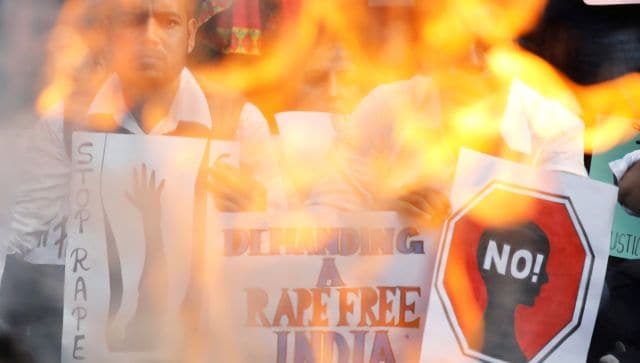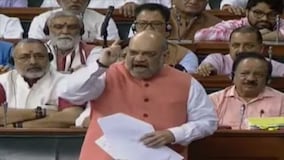Capital punishment, lynching, sedition: How criminal laws could change
Home minister Amit Shah introduced three Bills in Lok Sabha today (11 August), with an aim to reform India’s criminal justice system. From capital punishment for mob lynching to repealing sedition law, here are the big modifications proposed by the Centre

Home Minister Amit Shah told Parliament that these new Bills would ensure the police cannot 'exploit their powers'. PTI
Union home minister Amit Shah introduced three Bills in Lok Sabha today (11 August) that intend to reform India’s criminal justice system. The Bharatiya Nyaya Sanhita, 2023 will replace the Indian Penal Code (IPC), framed by the British in 1860.
The Code of Criminal Procedure (CrPC) will give way to Bharatiya Nagarik Suraksha Sanhita, 2023, while the Indian Evidence Act of 1872 will be replaced by the Bharatiya Sakshya Bill, 2023, noted Bar and Bench.
Addressing the Lower House of Parliament, Shah said the aim of these bills is not to “punish” but “provide justice”. “The laws that will be repealed… the focus of those laws was to protect and strengthen the British administration, the idea was to punish and not to give justice. By replacing them, the new three laws will bring the spirit to protect the rights of the Indian citizen,” the Home Minister said, as per the news agency PTI.
Related Articles
“The aim will not be to punish, it will be to provide justice. Punishment will be given to create a sentiment of stopping crime,” he added.
#WATCH | Union Home Minister Amit Shah speaks on Bharatiya Nyaya Sanhita Bill, 2023; The Bharatiya Sakshya Bill, 2023 and The Bharatiya Nagrik Suraksha Sanhita Bill in Lok Sabha.
He says, “From 1860 to 2023, the country’s criminal justice system functioned as per the laws made… pic.twitter.com/TIcoeaXvjG
— ANI (@ANI) August 11, 2023
These three Bills will be sent for further scrutiny to a parliamentary panel, Shah said, as per the news agency.
Let’s take a closer look at some of the big overhauls of the criminal laws proposed by the Centre.
Sedition to be ‘repealed’
Union minister Shah told Parliament that the sedition law will be “completely repealed” in the new legislation. Section 124A of the IPC which criminalises sedition will be replaced by Section 150 which includes “acts endangering the sovereignty, unity and integrity of India”. Bhartiya Nyaya Sanhita Bill also has provisions for “offences against the state”.
As per NDTV, Section 150 states: “Whoever, purposely or knowingly, by words, either spoken or written, or by signs, or by visible representation, or by electronic communication or by use of financial means, or otherwise, excites or attempts to excite, secession or armed rebellion or subversive activities, or encourages feelings of separatist activities or endangers sovereignty or unity and integrity of India; or indulges in or commits any such act shall be punished with imprisonment for life or with imprisonment which may extend to seven years and shall also be liable to fine”.
Its explanation reads: “Comments expressing disapprobation of the measures, or administrative or other action of the Government with a view to obtain their alteration by lawful means without exciting or attempting to excite the activities referred to in this section.”
Meanwhile, Section 124A of the IPC says: Whoever, by words, either spoken or written, or by signs, or by visible representation, or otherwise, brings or attempts to bring into hatred or contempt, or excites or attempts to excite disaffection towards, the Government established by law in, shall be punished with imprisonment for life, to which fine may be added, or with imprisonment which may extend to three years, to which fine may be added, or with fine.
Death penalty in mob lynching cases
The Centre plans to bring the provision of capital punishment in mob lynching cases.
“When a group of five or more persons acting in concert commits murder on the ground of race, caste or community, sex, place of birth, language, personal belief or any other ground each member of such group shall be punished with death or with imprisonment for life or imprisonment for a term which shall not be less than seven years, and shall also be liable to fine,” India Today cited the new provision as saying.

Other changes
Shah said introducing the Bharatiya Suraksha Sanhita Bill, 2023 that as many as 313 alterations are being brought in India’s criminal justice system, reported Indian Express.
The Centre has proposed a punishment of 20 years or life imprisonment in gang rape cases and the death penalty for the rape of minors, as per NDTV.
Recording statements on video of victims of sexual crimes will be made compulsory, as per LiveLaw.

The term “life imprisonment” has been described as “imprisonment for natural life”. According to India Today, the new laws also want to grant punishment for revealing the identity of rape survivors.
As per LiveLaw, offences against children will now attract 10 years in jail from the previous seven years.
Shah told Parliament that these new Bills ensure the police cannot “exploit their powers”. The police would not be able to delay investigations and will have to file charge sheets within 90 days of the filing of FIR, the Union minister said. “The investigation will have to be completed within 180 days in all cases. The judge will have to give verdicts within 30 days of framing of charges,” according to Hindustan Times (HT).
“‘Deemed Sanction’ to prosecute civil servants, police officer accused of criminal offences in case of authority’s failure to respond within 120 days of application”, according to LiveLaw.
Under the new laws, trials can be conducted even if the accused is absconding.
The Union home minister said the Centre plans to increase conviction rate above 90 per cent. Under Bharatiya Suraksha Sanhita Bill, 2023, “we have set the goal that the conviction ratio has to be taken above 90 per cent. That is why, we have brought an important provision that the Sections which provide for seven years or a greater jail term, under all those cases forensic team’s visit to the crime scene will be made compulsory…” Indian Express quoted Shah as saying.
Organised crimes can lead to harsher punishments, while a separate provision for chain/mobile snatching and similar offences is also proposed under the new laws, as per LiveLaw.
With inputs from agencies
also read

Amit Shah reviews disaster management, Left Wing Extremism situation in Odisha
Odisha Chief Minister Naveen Patnaik, Union Home Secretary and senior officers of the Ministry of Home Affairs and State Government attended the meeting

Opposition MPs meet Lok Sabha Speaker Om Birla, urge him to come back to the House
Speaker Om Birla, who is learnt to be upset at the repeated disruptions of the House, did not Chair the proceedings during Question Hour for the second consecutive day

First installment of Rs 10,000 each transferred to 112 Sahara beneficiaries, says Amit Shah
"Today, the first instalment of Rs 10,000 each has been transferred to 112 beneficiaries. Till now, 18 lakh people have registered on the portal," said Shah


